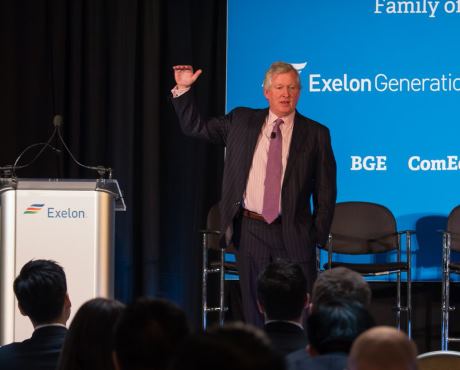Exelon will continue to advocate for public policy that recognises the clean energy attributes of nuclear plants but has warned it will have no choice but to close plants that remain unprofitable.
 |
| CEO Chris Crane outlines plans to grow Exelon's business (Image: Exelon) |
In a presentation to analysts on Wednesday, CEO Chris Crane and senior Exelon leaders outlined plans to invest $25 billion in critical infrastructure, smart grid technology and other reliability and customer service improvements at its utilities over the next five years. Cash flow from the company's generation activities will be used to fund the investments.
Crane described 2016 as a "pivotal year" for nuclear power plants which have faced financial challenges driven by cheap gas prices and the "unintended consequences" of government mandates which had tended to prefer renewables over other low-carbon or carbon-free alternatives and failed to compensate properly for carbon-free generation.
He praised the recent approval by the New York Public Service Commission of a Clean Energy Standard (CES) explicitly recognising the zero-carbon contribution of nuclear power plants via credits based solely on the social cost of carbon. Approval of the CES has helped to assure the continued operation of Exelon's Nine Mile Point and RE Ginna nuclear power plants in upstate New York, and furthermore enabled Exelon to move to acquire the Fitzpatrick plant from Entergy, which otherwise would have faced closure in early 2017.
The failure of Illinois to enact legislation that would have preserved the Clinton and Quad Cities plants, however, meant that the company had "no choice" but to proceed with preparations for the closure of the units. Exelon announced in June that Clinton would close in 2017 and Quad Cities the following year following seven years of losses despite being two of the utility's best-performing plants.
"We will continue to work for solutions in our states to preserve these generation fleets, but we do need the states to step up and recognise the value of these assets and what they contribute to communities and the environment," Crane said. He warned that nuclear plants must still perform economically. "Where we can't see a path to sustained profitability, we have no choice but to shut down plants," he said.
In answer to questions, Exelon Generation CEO Ken Cornew confirmed that the "drop dead" date after which the company would be unable to reverse its decision on Quad Cities and Clinton plants would be December 2016. Further decisions on the Illinois legislation could be made in state meetings scheduled for late November and early December, but Cornew cautioned that there was "no certainty" of the outcome of those meetings.
Researched and written
by World Nuclear News







_97013.jpg)






